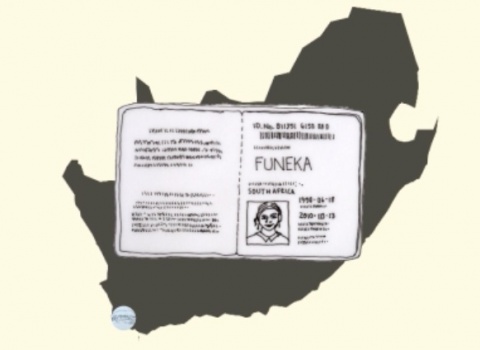
Inspired by the National Planning Commission’s story of Thandi, which Trevor Manuel told as a way to depict the key challenges facing the country, IkamvaYouth has launched Funeka’s Story, which explains IkamvaYouth model and its impact, and sends out a call for volunteers and supporters.
[video:http://youtu.be/NEFflXglk28 align:center]
A BIG UP THANK YOU to:
* Funeka, for sharing your story and being such a professional voice-over artist!
* Capitec for availing Funeka during work hours to go to the sound studio
* Dan Eppel who recorded and mixed the sound
* Freshly Ground for donating the tunes
* the staff and interns who helped behind the scenes,
and especially to:
* Lynne Stuart (@ideainaforest) for applying her design talents to explain what we do so concisely and beautifully!

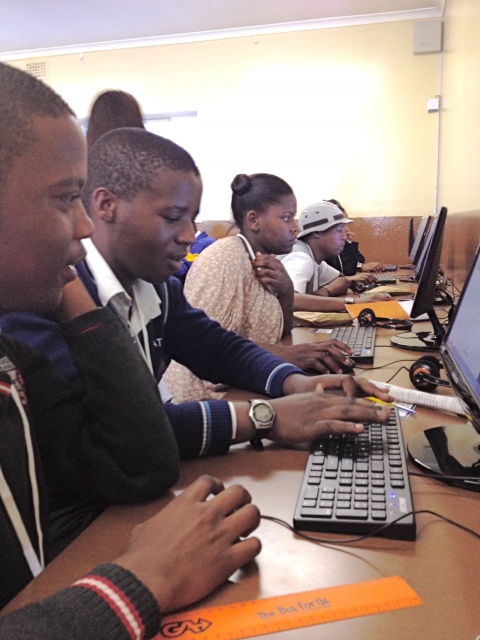
This past Friday finally saw months of preparation and planning for our annual Career Indaba come together in a hugely successful day. Over 1800 students, parents, and community members flooded the Zolani Centre hall in Nyanga to explore their post matric choices and job opportunities.
IkamvaYouth’s founding motto is one of future-oriented thinking and pro-activity. The Careers Indaba is a fundamental step in fostering this mind set in the youth of South Africa. It is challenging to dream of a better future and to aspire to goals without knowing the realities of these goals and the opportunities that are available.

The event was open to high school learners from around Khayelitsha, Nyanga, Masiphumelele and surrounds, who came together to think about their futures and really take their lives into their own hands. They were informed not only about their career options, but also attended workshops on financial literacy by Capitec, and CV writing, interview skills and online CV development through Career Planet.
Over 25 Universities, companies, professionals and NPOs from all over Cape Town attended the Indaba as exhibitors. They did not merely provide factual information about careers and studying opportunities, but they also conversed with these young people and delivered a message of hope and possibility. This message is crucial for youth who are the victims of poor education systems and who live in a community plagued by poverty and all its products: IkamvaYouth focuses on changing the mind-set of youth, to think beyond their immediate circumstances and to believe in themselves and the possibilities that their futures hold.
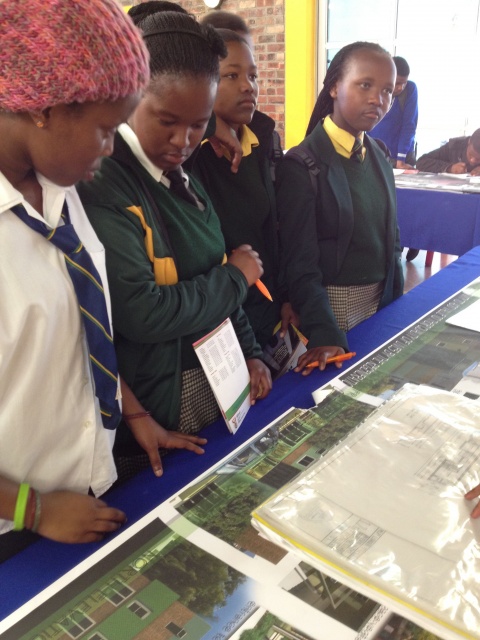
The day was an inspiring success, with many learners and exhibitors commented at how much they had gained from the experience. Axolile, grade 10 from Sizimisle Technical High School said the most important thing he learnt is, ‘to know what you want to be in life and be dedicated, this will for sure get you to be where you want to be. ‘ While Sizalobuhle from Sinako High School said that, ‘ the Career Indaba helped me learn more about my dream career of being a lawyer, where to study and how to get into the best courses and universities. I also found out about how to apply for bursaries, and how to manage my money through the workshops.’
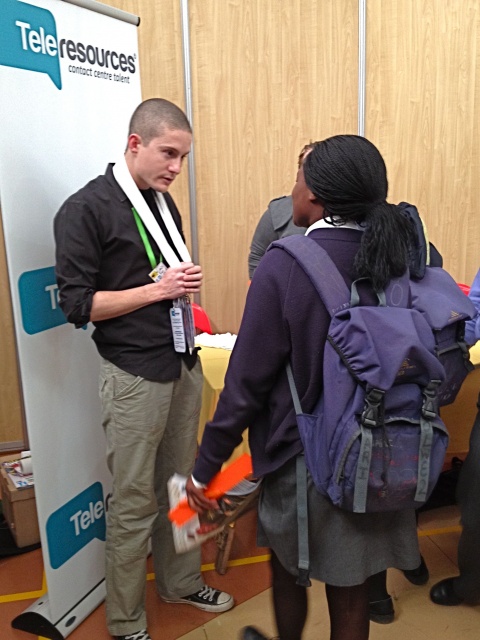
To organize an event of this size we partnered with Equal Education in helping to organize exhibitors and set up the event, and SAEP and the Department of Social Development joined the crew. We are also hugely appreciative to Mxolisi and his team at the Zolani Centre for the use of the hall and surrounding spaces.
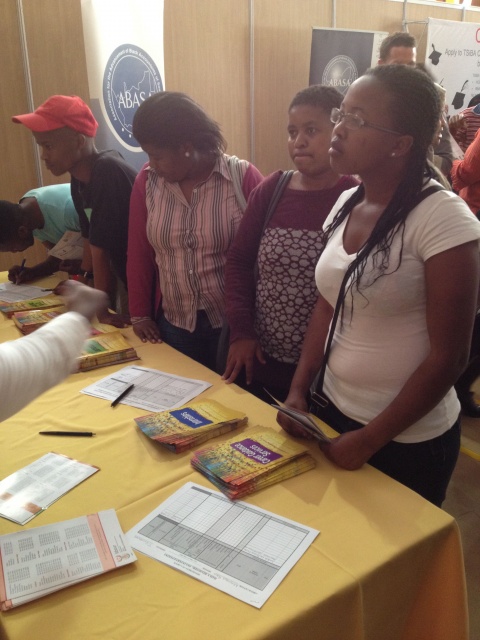
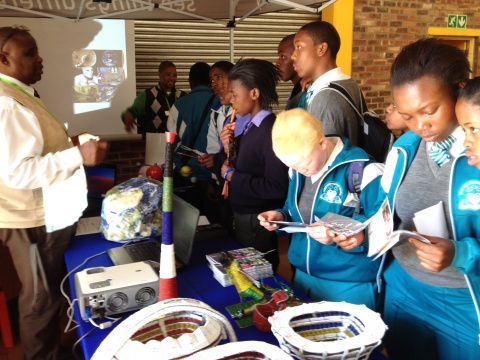
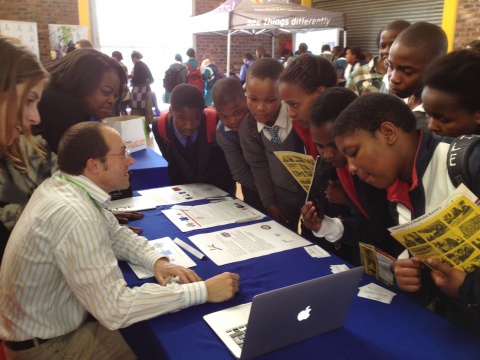

It may have been about 2 months ago since we’ve had our winter school programme at the Masi branch, but yet it feels like 2 weeks ago. We hosted it at the Masiphumelele library, which is also our venue for the homework and tutoring sessions. Despite all the challenges we faced during the preparation of the programme, and with the help of our World Teach, local volunteers and Masi library staff, we managed to deliver an awesome winter school for our 87 learners…filled with tutoring and great workshops, from Creative Writing to Life Science experiments.
Besides the tutoring sessions that took place in the mornings,


The ever so handy Answer Series books for Grade 10 – 12.
This is what also went down during the afternoons
- Nadia Kimmie offered her skills and ran a pottery workshop with some of the learners (below is some of the work the learners did themselves),

Creativity at its best, right?
- A leadership workshop ran by Nico. This helped the learners a lot in boosting their confidence, taking initiative, and to always rise to the occasion.
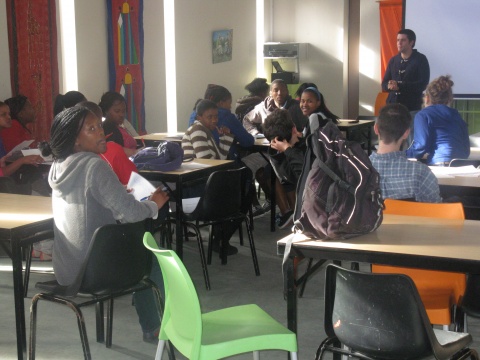
- Ros and Dorothy from Fundza as well as Kate (a volunteer from World Teach) facilitated Creative Writing workshops for the learners. At the end, the learners were able to write their own poems as well as short stories. You’ll never know maybe the next Harmony High Series book will be written by an Ikamvanite…Watch this space!



Ziyanda Mwanda conducted Life Science and Chemistry experiments with the science learners. Here are some of the experiments conducted: looking at mitosis and understanding the process, testing for the presence of starch, observing osmosis using plant tissue, what are acids and bases – using household products and food. HIP2B2 got the learners thinking on their feet…who said math and science was boring? Learners had to conduct fun experiments and the team with the best results won a prize.
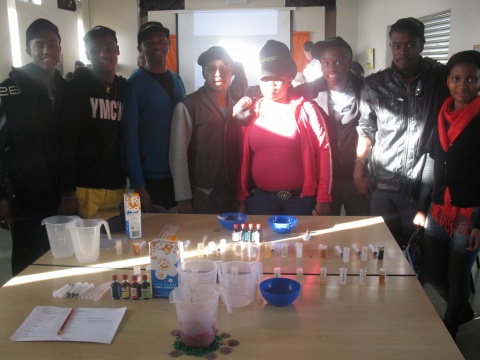

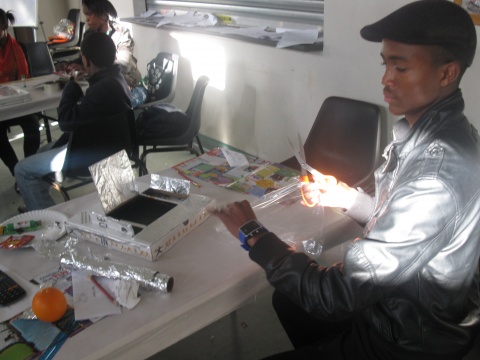
Siobhan Hayes (our Canadian intern) facilitated entrepreneurship workshops where learners knew more about how to start a business, marketing, and on the last day of the winter school programme the learners (Company name: Popcorn Divas) sold popcorns to their fellow Masinites.
Capitec Bank ran a financial literacy workshop whereby learners got to know the importance of saving money and why one should budget.
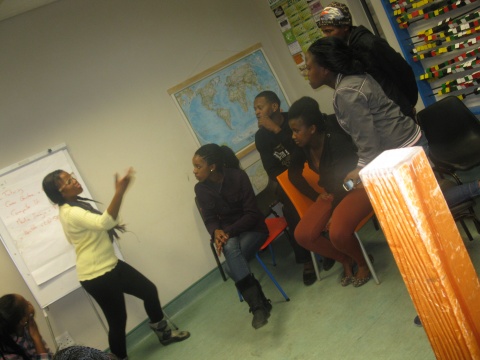
The UWC HIV/AIDS Peer Education Programme joined us and their peer educators ran a health and life skills workshop. As we know, the youth is involved in risky behavior, so the learners learnt quite a lot and importantly, how to take care of themselves. OIL Sexual Health also ran a sexual education workshop. The Live Mag team also took part and ran a media and arts workshop.
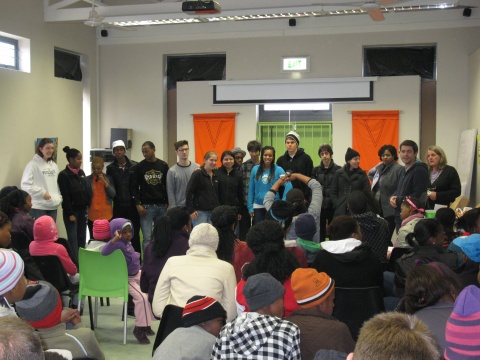
ERM (Environmental Resources Management) teamed up with the learners and got to work on an Environmental Management Plan for our branch, which looks at the environment and sustainability. The learners also got know more about careers in the environmental field, thanks to ERM.
Mathew (from the Cape Leopard Trust) took some of the learners on a hike at Silvermine where they got to know more about nature and the environment and also preserving it.
Thanks to Nick Jones for facilitated a history workshop, Nate and Buhle who ran a debating workshop with the learners…philosophical stuff I tell you. Fatima (a Pilot) ran an aeronautics workshop with the learners, where they got to know more about airplanes.
And all of this was just some of the things that happened. All the hard work put in was really worth it at the end. THANK YOU TO EVERYONE WHO WAS PART OF THIS AMAZING TWO WEEKS!!! Those above-mentioned are just a few of them. The winter school wouldn’t have been that awesome without you.
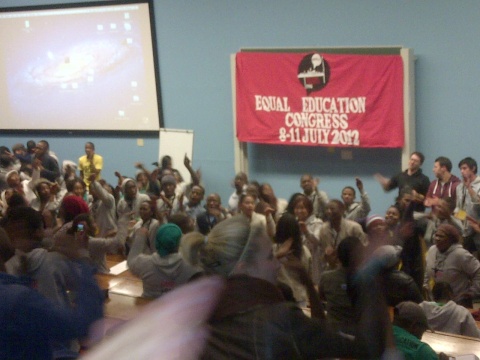

On the 7th of July 2012, I took a trip to the Equal Education Congress of 2012. The trip was fully funded by Equal Education (Many Thanks for the opportunity). It would be a very interesting 5 days for me. From the viewpoint of an outsider, the congress would be more of a learning experience more than anything.
Arriving on Sunday, the team was introduced to us and registration took place. The registration and off to Thembisa for the opening event, where we were welcomed by Archbishop Thabo Makgoba. After that we heard an address by Cosatu member Zwelinzima Vavi, who showed his support for the movement of Equal Education. Also on the speakers line up were equaliser (the title given to schoolgoing members) Khutso Mmapheto, and Equal Education Coordinator Doron Isaacs. After the event we boarded buses headed to UJ Aukland par campus where we would spend the the next 5 days.
Monday morning was cold in JHB, but maybe it was just the Durban in me. Breakfast was served in the dining hall, as would be the case for the rest of the week. The morning started with a plenary session on youth and politics globally. Mr Rob Peterson spoke about the Arab spring ( The revolutionary wave of demonstrations and protests occurring in the Arab world that began on 18 December 2010) . I found this very intersting. How an uprising in one country can spark fury in neighbouring contries with the same conditions. After tea the session continued with more guest speakers of note. The likes of Barbara Hogan and Vuyiseka Dubula-Majola graced the podium. After lunch, the congress was then split into groups.
Each group comprised about 30 members. These would be our groups for the duration. We spent the rest of the afternoon discussing how Equal Education can penetrate more in the community and find a more efficient way forward.
On Tuesday, delegates were divided into six groups and had an opportunity to attend some really cool educational tours. I had an opportunity to visit the constitutional court, which was an amazing experience for me. I had never been to a real court before, let alone South Africas highest court. We took a tour around the entire court, and Justice Edwin Cameron graced us with his presence, briefing us of what the court does and how it works. We were then transported to Soweto, where we would spend the rest of the evening. The equalisers then discussed what kind of leadership they wanted to lead the new Equal Education. Following the discussion, it was time to meet the candidates. The candidates then introduced themselves and this was followed by a voting process.
Wednesday saw more plenary discussions around the challenges in education. Guest speakers of the likes of Nic Spaull and Veronica Mashiyi (parent) graced the podium. Further discussions around issues such as what is an EE member, and the life cycle of an EE member where discussed in groups. Further discussions of the way forward took place in the group session. Later that evening after a short break, the new Leadership was then announced, the constitution was finalised and the congress was then brought a formal close.
Thursday was the big day, the day we would march for our education in the streets of Tembisa. The day started out like every other day. Cold due to the weather, fired up from the spirit of the equaliser. Buses lined up, food packages and equalisers chanting songs of Marching. The busses headed to Tembisa and when we got there, it was time to mobilise. The first order of business was to mobilise the community. I had the biggest challenge amongst my group, Language. I do not know any Sotho at all, and on that day, I felt it. But when the march began, I put on my marching boots. The route we took was the same route that the students of 1976 took. After the march we headed back to UJ for supper and a social event. The entertainment at the social event would be the last activity of the trip.
I wish Equal Education all the best in the future. In conclusion, this was a great opportunity for me to learn to learn from an organisation whose work is directly in line with what we do. Wishing Equal Education the best in their future.

(Listen to the actual debate at http://www.bbc.co.uk/radio/player/p00x8h4d)
Ikamvanites in Gauteng were invited to take part in the BBC Africa Debate at the University of the Witwatersrand on the 31st of August. The question posed was: South Africa at 18- Does black and white still matter in the rainbow nation? (Unfortunately, due to the nature of the topic and the manner in which BBC radio created the racial references, this article will also be using such terms.)
The debate was hosted by BBC radio presenters, Audrey Brown and Karen Allen, and a panel of speakers selected by BBC in an attempt to represent the “Born Free Generation” as people born on or post 1994. The panel was a strategized mix of Black and White persons from St Benedict’s Private School, Pretoria Boy’s High and Wits Students in an attempt to represent “all” youth. The audience consisted of political party representatives, organisations like Ikamva Youth and academics.
The panellists were divided both racially and with their opinions. However, their opinions were not divided according to race as predicted. Throughout the debate, depending on one’s personal background, circles of influence, experiences and current state of affairs, people felt and saw things differently.
Some youth stated that race does still matter and is still used as a form of identifying and relating to people – finding a commonness (based on cultural, linguistic and socio-economic) amongst a diversified crowd and finding it easier to socialise better with people who have the same social backgrounds. Is this based on the fear of rejection and the need for belonging that most humans feel? On the other hand, as highlighted by the presenters, race is possibly merely used as a code to cover up other issues, such as how race is experienced on a social level. It was great to see that after the debate, the IkamvaYouth learners, also Born Free, interacted with people outside of their normal circle – spreading their horizons.
Some of the issues raised involved nationalisation,education and poverty. A poll was raised and showed that the majority of the attendees were against nationalisation. In terms of the economy, some ‘Born Free’ learners argued that the need is for South Africa to focus on the mines and entrepreneurs to grow the national economy in order to develop society. The issue of shared wealth was then raised and with this race dimensions came up again. A majority of the audience share the view that the majority of poor people are black because the majority of South Africans are black and it is an underdeveloped country – hence the poverty. However, many still see it as: Black people are poor because they are black and financial status is a racial issue construed by the past racial injustices.
Most issues that were given attention were national issues. Policies of Apartheid reformation such as Affirmative Action, BEE and the Constitution were brought up and their role in healing the racial divide were questioned. Unemployment and access to equal opportunities is an evident issue that maintains the gap between the rich and poor. With statistics showing that South Africa has overtaken Brazil GINI ratio – wealthiest. White per capita is 8 times more than black per capita.
This shows that real issues facing South Africans are issues of inequality based on many issues with race only being a structural component created by history and inherently inherited.It was largely seen that differences in race still matters only because South Africans make it matter. All the views of participants were forcibly related to racialism and were rarely from a personal experience of injustice. It seems that society continues to insist on segregation economically, linguistically, geographically and ethnically. One of the audience members noted that: ‘the rainbow colours never mix’, maybe it is inherently human nature to distinguish through separation rather than taking advantage of differences to enhance the whole. There is a shared fear of being different because South Africans were once forced to be different based on race only. The question posed was: when will South Africans stop being forced as well as force ourselves to view one another as Black and White?
IkamvaYouth is at the core at tackling these issues and is a community that is aware, wants to be heard and has the power to make a greater change – The views many Ikamvanites have are from a personal and sincere point of view. These views matter and make issues and discussions more linked to the humaneness of the issues people face on their daily lives.

Ikamvanites, Speak Out! Only you can represent your views with the intensity that they should be viewed. If you feel strong about something – Shout!
Thank you IkamvaYouth for showing us that our voice matters!
Written by Kihisha Suleman (Volunteer in charge of Career Guidance at Ebony Park)























 Lloyd Lungu
Lloyd Lungu